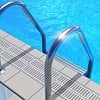A 3D printed ball created in Dalhousie University in Halifax can help detect COVID-19 in wastewater and is being shipped nationally and internationally to help scientists and researchers in their fight against the pandemic.
A team of researchers started this project last year, and the device cost $1 to build.
“My PHD student Emily Hayes and I worked together. She came up with this brilliant idea to 3D print a ball that could then be used to capture COVID-19 in wastewater,” said Graham Gagnon director of the Dalhousie University Centre for Water Resource Studies.

The device is a two stage process that involves collecting and measuring.
“It's the collection side which is what the device is doing and the measurement side which would be done in the lab,” explained Gagnon.
It is left in the water for around 24-48 hours before being measured.
Although the ball itself is fairly inexpensive, the labour around it and the materials that went into it were not inexpensive.
“It's 3D printed and of course the test itself is not a dollar worth, it actually cost quite a considerable amount to deploy it but the first ball if you will is about a dollar,” said Gagnon.

The lab has received local requests about their tool from the Government of Nunavut, BC Centre for Disease Control, and Northwest Territories.
However, it was the lab’s long standing partners -LuminUltra - that enhanced and commercialized their design to sell to various marketplaces.
"We worked on a simplified method for releasing viral material from the samplers. This will allow the method to be distributed to new users with minimal training," said Jordan Schmidt, Ph.D., Director of Product Applications at LuminUltra Technologies.
Gagnon said their Dalhousie team sent out over 100 devices, "I expect LuminUltra will well be over a thousand based on some of the market questions we’ve seen."
Schmidt says his goal is helping as many people as possible and stem the tide of COVID-19 infections.
"The passive samplers developed by Dalhousie University are a great complimentary tool to existing testing programs for wastewater based epidemiology."
In terms of future projects for the university research team, Gagnam told KelownaNow they are constantly experimenting with new ideas.
“The idea of wastewater epidemiology or surveillance is really new, so a lot are asking what else could we measure?”
















